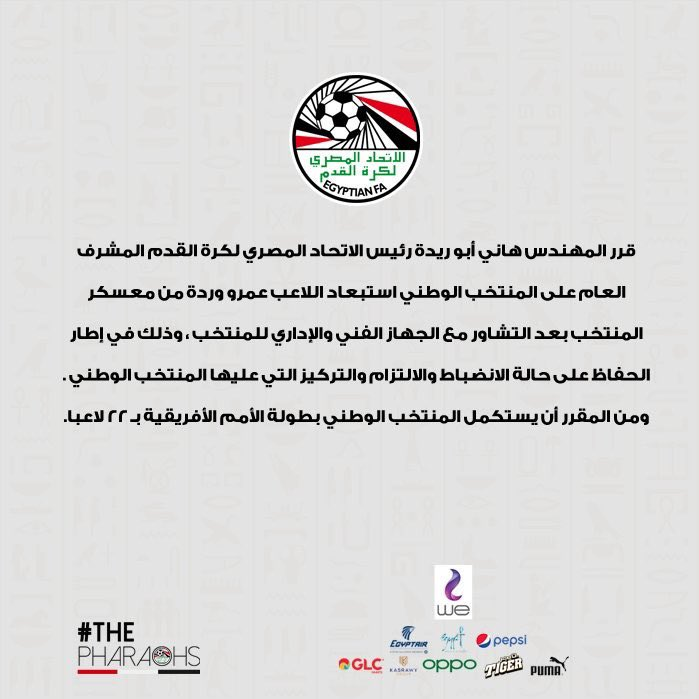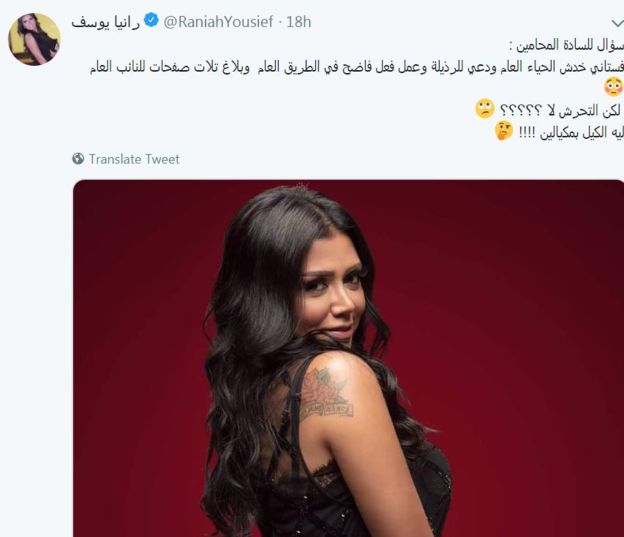Article 306 of the Egyptian penal code defines a sexual harasser as an individual who approaches others in public, private, or frequented places with gestures, words, or actions of a sexual or lewd nature, by any means including all means of communication, whether by telephone,
As the events of this scandal unfurled over last week, Egyptians almost had a #MeToo moment of their own, before it all crumbled into nothing. It all started when Merhan Keller, a Dubai-based British-Egyptian model, released screenshots of four Egyptian footballers liking several of her Instagram posts, with one
What started out as a friendly chatter ended with aggressive sexual advances from the national team’s midfielder. Keller released disturbing screenshots and voice notes of Warda’s relentless pursuit. He didn’t take no for an answer, and when Keller made it clear that nothing was going to happen, Warda lashed out, asking the 21-year-old if she was a virgin, and then started intimidating her with the usual threats of “you don’t know who I am”, and Warda’s own “Nobody ignores me”.
A public debate ensued, with many accusing the model of faking the exchange for fame. However, other females decided to share their encounters with the 25-year-old, proving to the public that this man is indeed a sexual predator. For instance, in the screenshots of her WhatsApp conversation with Warda, Mexican model Giovanna Fall exposed Warda and called him out for his pushy language and manipulative attitude. In more than one instance, Warda asked her to video call him and show him her body. He also went on to send her a video of him exposing himself. For the record, Warda claimed that the video was fabricated. However, in his conversation with Fall, when she confronts him about the video he sent, he doesn’t deny it.

The third scandal was nothing but appalling, as released screenshots show Warda, a 25-year-old adult, soliciting a 16-year-old minor, and when the girl confronted him with his age, the footballer simply texted “I don’t care”.
Public outcry called for Warda’s suspension, and the Egyptian Football Association (EFA) promptly released a statement, which read as follows: “The Head of the EFA Hani Abu Reda has decided to dismiss Amr Warda from the team’s camp after consulting with the team’s technical and administrative staff to preserve the national team’s state of discipline, focus, and commitment”.

Shortly
To add insult to injury, many players stood in solidarity with their teammate, including the team’s captain Ahmed Al-Mohamdy, who celebrated his goal against the Democratic Republic of Congo by holding two fingers on each hand to symbolise 22, Warda’s squad number. The national team’s defender Baher Al-Mohamdy also raised Warda’s jersey following the win.

However, the most shocking remarks came from Egyptian forward Mohammed Salah, who tweeted about the scandal, describing it as wrong, but asking the public to forgive Warda and give him a second chance. A bit hypocritical in my opinion, since in April, the Liverpool footballer was hailed for his comments in a Time magazine interview, in which he called for a change in the way women are treated in Arab culture.
Meanwhile, Dar Al-Ifta, Egypt’s central Islamic authority for issuing religious edicts, published a tweet urging Egyptians to protect offenders from scandal, which was interpreted by many as siding with Warda.
Online, the public was torn between those praising the EFA’s decision, and those demanding the footballer’s return.
Unfortunately, what seemed like a victory for victims of sexual harassment was short-lived as in less than 48 hours after Warda’s public apology, the decision was reversed, and the midfielder returned to training for Egypt’s next match.

The official statement from the EFA read:
[President] Hani Abu Reda praised the spirit of solidarity between the players and their desire to pardon their colleague Amr Warda and to lift the suspension from him and their commitment to any decision issued by the Football Association in this regard.
He decided to reduce the penalty of suspension until the end of the first round of the tournament only. Abu Reda assured the players of his demand and the demand of all of them to continue this solidarity between them and reflected on their performance in the stadium to delight their fans and the people of Egypt.
Salah preached about second chances, but according to The Guardian, Warda has had his fair share of “second chances”. In 2017, Warda was loaned to the Portuguese club Feirense in a deal that was cut short three weeks after his arrival, following media allegations that he had harassed the wives of two teammates. In 2013, when Warda was playing for the Egyptian national youth team, Veto Gate reported that he barged into the hotel room of a French tourist in Tunisia, prompting her to call security officials, who had held him in their custody until the decision came to suspend him from the team and put him on a flight to Cairo.

In a country where 99
Public figures and fellow teammates shamelessly stood by Warda’s side, despite all the incriminating evidence, without showing any remorse for the real victims of his actions.
In a Facebook post that summarized our hypocrisy as a nation, one user stated that in Egypt, the God of men is merciful, while that of women is severe in retribution, shedding light on how we, as Egyptians and Arabs, violently judge women while at the same time ask forgiveness for men.
I bet you if it was a woman, the outcome wouldn’t have been the same. In fact, why hypothesize when just a few months ago, actress Rania Youssef was aggressively attacked, sued, and prosecuted for wearing a “revealing” dress.
In an unfortunate turn of events, the actress was legally tried for wearing a “see-through” outfit in the closing ceremony of the 2018 Cairo International Film Festival, on November 29th. Prosecutors interrogated her for hours about her choice of clothing, and the charges weren’t dropped until she had publicly apologized for her “provocative attire”.

In both the crime and punishment, the difference between the two incidents could not be more staggering. For instance, Youssef did not cause harm to anyone with her choice to wear a specific item of clothing. On the other hand, Warda actually caused irreparable emotional damage to many of his victims, yet, after
Once again, the Egyptian public has shown the world that here, men can get away with harassing women, and as long as the harasser apologizes, there is no need to “blow the situation out of proportion”. Boys will be boys, so why sweat it, right?!



